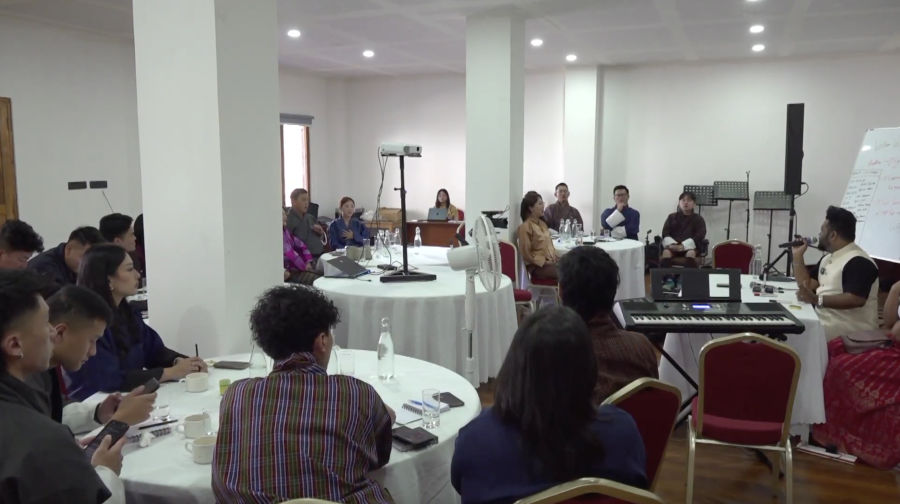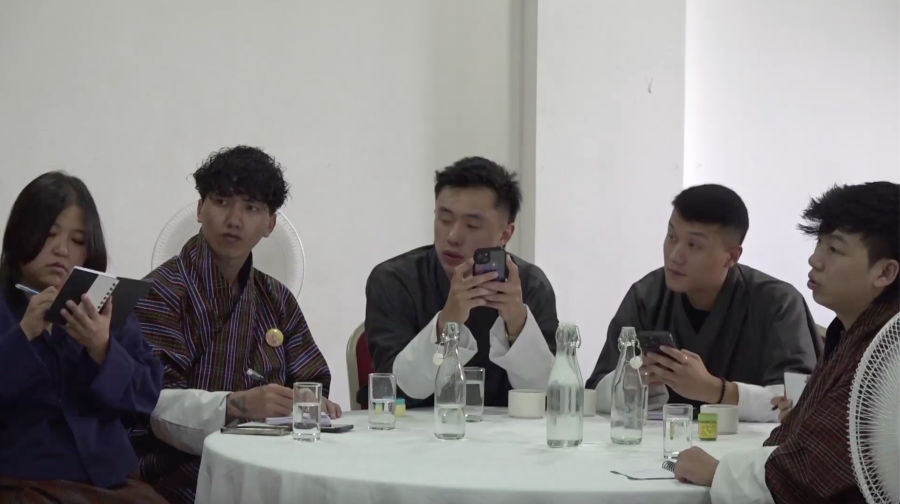 Over 20 local artists have gathered in Punakha for an eight-day training to sharpen their vocal skills and prepare for the international stage. While many in the country rely on natural talent, experts say that professional training is key, as the voice is a singer’s primary instrument. Organised by the Ministry of Industry, Commerce and Employment, the training covers vocal health, breath control, pitch, articulation, studio dubbing, and stage performance, among others. The training will end this Sunday.
Over 20 local artists have gathered in Punakha for an eight-day training to sharpen their vocal skills and prepare for the international stage. While many in the country rely on natural talent, experts say that professional training is key, as the voice is a singer’s primary instrument. Organised by the Ministry of Industry, Commerce and Employment, the training covers vocal health, breath control, pitch, articulation, studio dubbing, and stage performance, among others. The training will end this Sunday.
 These well-known faces have grown through passion and self-learning, with little international exposure and no vocal training institute in the country.
These well-known faces have grown through passion and self-learning, with little international exposure and no vocal training institute in the country.
Guided by experts from the Indian Film Industry, they are now learning techniques ranging from breathing exercises to stage performance.
The training is blending Western styles with Bhutanese music, helping singers refine their skills.
Beyond vocal techniques, the programme is also teaching participants how to promote and distribute their music on platforms like Spotify, an important step for those who see singing not just as a passion but as a career.
“With time, we need to improve their vocal quality, and they will also have a room to assess their own vocal scope and vocal potential. And with age, some of the artists might become stagnant. So, through this vocal training, we expect them to explore the different versions that they could go for genres like Pop, Rock and even rap and so on,” said Tempa Tshering, Chief Intellectual Property Officer, Ministry of Industry, Commerce and Employment.
“I am here to help them see how they can release multiple songs in a year, have a structure format in terms of branding, and you know whether it’s six songs year, ten songs year, have visions for themselves, not only from play back singing in films but also expanding to advertising to cartoon character singing, live singing in concerts and eventually getting more singles and establishing themselves and putting music from Bhutan that could reach out to the world,” said Thomson Andrews, Trainer, India.
Participants shared that producing a quality song involves many techniques, most of which they are learning through the training.
“When we go outside the country, like when we mingle with artist, they usually ask us where you trained. How many experience we have? In such situation we find it difficult to explain ourselves that what we say is we were trained by ourselves,” said Pema Deki, Artist.
“So, first we start with our breathing exercise because breathing, I mean, vocal is an instrument, it is all about our voice backed up by the stomach and the lungs. It’s a play of the air. So, we started with our breathing exercises to know when to stop, when to do the long notes and lower notes and how to make sure that you sound at the same time without losing the beauty,” said Tandin Wangchuk, Artist.
Some artists added that Bhutan needs a vocal training institute, as more young and aspiring singers are emerging.
“Because we are all singers, this is not our part-time job. We are completely focused on singing. We are earning from singing, we are travelling from singing, and we are benefiting our families from singing. So now,I think it’s high time we need a vocal training institution, which I am going to, it is my dream,” said Pema Deki, Artist.
“The art industry is one of the major industries that contributes to the economy in general. In Bhutan, it will be lovely to have these art institutions like we have in different countries because the talent is crazy here. And they are all self-taught, and to be self-taught and be so good if they have the backing and support like how the government is giving currently, the sky is the limit,” said Thomson Andrews, Trainer, India.
With programmes like this, Bhutanese artists are not only refining their skills but also gaining the tools to reach global audiences, paving the way for a stronger and more professional music industry in the country.
Changa Dorji, Punakha
Edited by Sonam Pem









